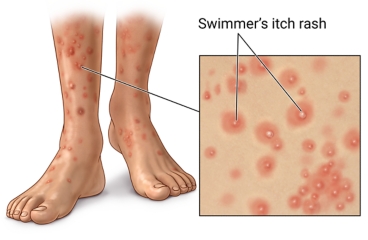
Overview
Swimmer's itch is a rash caused by an allergic reaction to the larvae of certain parasites. A parasite is an animal or plant that lives in or on another animal or plant (called the host). The rash looks like reddish bumps on the skin. It often appears outside the bathing suit. How severe the rash is may vary for people exposed to the same parasites.
The parasites can get under your skin when you swim in fresh water (such as lakes and ponds) and sometimes in salt water. This causes an allergic reaction and an itchy rash. The itching is worse in the first few days after it starts. Then it gets better after about a week. Because the parasite can't live in the human body, swimmer's itch goes away on its own.
You don't get swimmer's itch from swimming pools that are treated with chlorine. And it doesn't spread from person to person.
Follow-up care is a key part of your treatment and safety. Be sure to make and go to all appointments, and call your doctor if you are having problems. It's also a good idea to know your test results and keep a list of the medicines you take.
How can you care for yourself at home?
If your skin itches
- Put cool, wet cloths (compresses) on your skin.
- Put calamine lotion on your skin.
- For a short time, use an anti-itch cream like hydrocortisone that you can buy without a prescription in a grocery store or drugstore.
- Take an over-the-counter antihistamine. Be safe with medicines. Read and follow all instructions on the label.
- Add a handful of Epsom salts, baking soda, or oatmeal (ground to a powder) to your bath. Or you can try an oatmeal bath product, such as Aveeno.
To help prevent swimmer's itch
- Avoid lakes or ponds that are known to have outbreaks of swimmer's itch.
- Shower as soon as you get out of a lake or pond.
- Dry off briskly with a towel.
When should you call for help?
Call your doctor now or seek immediate medical care if:
- You have symptoms of infection, such as:
- Increased pain, swelling, warmth, or redness.
- Red streaks leading from the area.
- Pus draining from the area.
- A fever.
Watch closely for changes in your health, and be sure to contact your doctor if:
- You are not getting better as expected.
Where can you learn more?
Go to http://www.healthwise.net/patientEd
Enter S002 in the search box to learn more about "Swimmer's Itch: Care Instructions".
Current as of: December 4, 2024
Author: Ignite Healthwise, LLC Staff
Clinical Review Board
All Ignite Healthwise, LLC education is reviewed by a team that includes physicians, nurses, advanced practitioners, registered dieticians, and other healthcare professionals.

